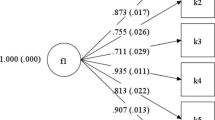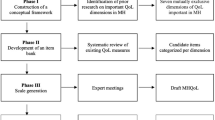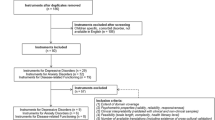Abstract
Purpose
Caregiver burden considerably affects the lives of families providing care to people with advanced cancer. The aim of this study was to validate the Greek translation of the revised Bakas Caregiving Outcomes Scale (BCOS) with a sample of informal caregivers of people with advanced cancer receiving outpatient palliative radiotherapy.
Methods
Following a formal “forward–backward” method to translate the original BCOS into Greek, the scale was administered to 100 consecutive family caregivers. Participants also completed the Greek Hospital Anxiety and Depression Scale (G-HADS) and five quality-of-life related linear analogue scale assessment (LASA) scales. Validity and reliability analyses were performed.
Results
The Cronbach’s α coefficient for the total BCOS score was 0.83. Test–retest reliability analysis in a subgroup of caregivers (n = 40) revealed good short-term stability over a 2-week interval. Exploratory factor analysis generated a one-factor structure for the Greek translation, which was further confirmed through confirmatory factor analysis. Construct validity was supported through the scale’s high correlations with G-HADS anxiety (−0.524; p < 0.001) and depression (−0.533; p < 0.001) scores, and LASA quality of life scores (0.696; p < 0.001). The BCOS discriminated well between groups of caregivers with different levels of quality of life. A total score of 52.5 offered high sensitivity (91 %) and specificity (86 %) in detecting highly burdened caregivers.
Conclusions
The Greek version of the BCOS is a psychometrically sound instrument that can be usefully implemented into clinical practice to identify family caregivers in need for support, and stimulate relevant research in our country.

Similar content being viewed by others
References
Nijboer C, Tempelaar R, Sanderman R, Triemstra M, Spruijt RJ, van den Bos GA (1988) Cancer and caregiving: the impact on the caregiver's health. Psychooncology 7:3–13
Thomas C, Morris SM (2002) Informal carers in cancer contexts. Eur J Cancer Care (Engl) 11(3):178–182
Garlo K, O'Leary JR, Van Ness PH, Fried TR (2010) Burden in caregivers of older adults with advanced illness. J Am Geriatr Soc 58(12):2315–2322
Higginson IJ, Gao W (2008) Caregiver assessment of patients with advanced cancer: concordance with patients, effect of burden and positivity. Health Qual Life Outcomes 6:42
Given CW, Given B, Azzouz F, Kozachik S, Stommel M (2001) Predictors of pain and fatigue in the year following diagnosis among elderly cancer patients. J Pain Symptom Manag 21(6):456–466
Papastavrou E, Charalambous A, Tsangari H (2009) Exploring the other side of cancer care: the informal caregiver. Eur J Oncol Nurs 13(2):128–136
Haley WE (2003) Family caregivers of elderly patients with cancer: understanding and minimizing the burden of care. J Support Oncol 1(4 Suppl 2):25–29
Georgas J, Christakopoulou S, Poortinga YH, Angleitner A, Goodwin R, Charalambous N (1997) The relationship of family bonds to family structure and function across cultures. J Cross-Cult Psychol 28(3):303–320
Van Pelt DC, Milbrandt EB, Qin L, Weissfeld LA, Rotondi AJ, Schulz R, Chelluri L, Angus DC, Pinsky MR (2007) Informal caregiver burden among survivors of prolonged mechanical ventilation. Am J Respir Crit Care Med 175(2):167–173
Deeken JF, Taylor KL, Mangan P, Yabroff KR, Ingham JM (2003) Care for the caregivers: a review of self-report instruments developed to measure the burden, needs, and quality of life of informal caregivers. J Pain Symptom Manag 26(4):922–953
Visser-Meily JM, Post MW, Riphagen II, Lindeman E (2004) Measures used to assess burden among caregivers of stroke patients: a review. Clin Rehabil 18(6):601–623
Bakas T, Champion V (1999) Development and psychometric testing of the Bakas Caregiving Outcomes Scale. Nurs Res 48(5):250–259
Bakas T, Champion V, Perkins SM, Farran CJ, Williams LS (2006) Psychometric testing of the revised 15-item Bakas Caregiving Outcomes Scale. Nurs Res 55(5):346–355
Bakas T, Burgener SC (2002) Predictors of emotional distress, general health, and caregiving outcomes in family caregivers of stroke survivors. Top Stroke Rehabil 9(1):34–45
Bakas T, Barr J, Croner D, Schmidt C, Hardin K (2000) Psychometric analysis of the Bakas Caregiving Outcomes Scale in the lung cancer population. In: 24th Annual Midwest Nursing Research Society Conference, Dearborn, MI
Buscemi V, Font A, Viladricht C (2010) Focus on relationship between the caregivers unmet needs and other caregiving outcomes in cancer palliative care. Psicooncología 7(1):109–125
Bakas T, Pressler SJ, Johnson EA, Nauser JA, Shaneyfelt T (2006) Family caregiving in heart failure. Nurs Res 55(3):180–188
Pressler SJ, Gradus-Pizlo I, Chubinski SD, Smith G, Wheeler S, Wu J, Sloan R (2009) Family caregiver outcomes in heart failure. Am J Crit Care 18(2):149–159
Papastavrou E, Kalokerinou A, Papacostas SS, Tsangari H, Sourtzi P (2007) Caring for a relative with dementia: family caregiver burden. J Adv Nurs 58(5):446–457
Zarit SH, Reever KE, Bach-Peterson J (1980) Relatives of the impaired elderly: correlates of feelings of burden. Gerontologist 20(6):649–655
Flynn Longmire CV, Knight BG (2011) Confirmatory factor analysis of a brief version of the Zarit Burden Interview in Black and White dementia caregivers. Gerontologist 51(4):453–462
Guillemin F, Bombardier C, Beaton D (1993) Cross-cultural adaptation of health-related quality of life measures: literature review and proposed guidelines. J Clin Epidemiol 46(12):1417–1432
Zigmond AS, Snaith RP (1983) The hospital anxiety and depression scale. Acta Psychiatr Scand 67(6):361–370
Mystakidou K, Tsilika E, Parpa E, Katsouda E, Galanos A, Vlahos L (2004) The Hospital Anxiety and Depression Scale in Greek cancer patients: psychometric analyses and applicability. Support Care Cancer 12(12):821–825
Bretscher M, Rummans T, Sloan J, Kaur J, Bartlett A, Borkenhagen L, Loprinzi C (1999) Quality of life in hospice patients. A pilot study. Psychosom 40(4):309–313
Hinkle DE, Wiersma W, Jurs SG (2002) Applied statistics for the behavioral sciences. Wadsworth Publishing, Belmont
Harman HH (1967) Modern factor analysis. University of Chicago Press, Chicago
Arbuckle JL (2006) AMOS 7.0 user's guide. Amos Development Corporation. SPSS, Chicago
Byrne BM (1989) A primer of LISREL: basic applications and programming for confirmatory analytic models. Springer, New York
Browne MW, Cudeck R (1993) Alternative ways of assessing model fit. In: Bollen KA, Long JS (eds) Testing structural equation models. Sage, Newbury Park, pp 136–162
Bentler PM (1990) Comparative fit indexes in structural models. Psychol Bull 107(2):238–246
Jöreskog KG, Sörbom D (1993) LISREL VIII. A guide in the program and applications. Scientific Software, Nororesville
Benter PM, Bonett DG (1980) Significant tests and goodness of fit in the analysis of convariance structures. Psychol Bull 88:588–606
Bollen KA (1989) A new incremental fit index for general structural equation models. Sociol Methods Res 17:303–316
Polit DF (2010) Statistics and data analysis for nursing research, 2nd edn. Pearson Education Inc., Upper Saddle River
Thekkumpurath P, Walker J, Butcher I, Hodges L, Kleiboer A, O'Connor M, Wall L, Murray G, Kroenke K, Sharpe M (2011) Screening for major depression in cancer outpatients: the diagnostic accuracy of the 9-item patient health questionnaire. Cancer 117(1):218–227
Francis LE, Bowman KF, Kypriotakis G, Rose JH (2011) Relationships and emotional wellbeing among African American and White advanced cancer caregivers. Patient Educ Couns 85(3):446–453
Francis LE, Worthington J, Kypriotakis G, Rose JH (2010) Relationship quality and burden among caregivers for late-stage cancer patients. Support Care Cancer 18(11):1429–1436
Kotronoulas G, Wengström Y, Kearney N (2012) Informal carers: a focus on the real caregivers of people with cancer. Forum Clin Oncol 3(3):58–65
Patiraki-Kourbani E (2009) Palliative care. Faculty of Nursing, University of Athens, Athens
Grov EK, Fossa SD, Tonnessen A, Dahl AA (2006) The caregiver reaction assessment: psychometrics, and temporal stability in primary caregivers of Norwegian cancer patients in late palliative phase. Psychooncology 15(6):517–527
Netemeyer RG, Bearden WO, Sharma S (2003) Scaling procedures: issues and applications. Sage, Thousand Oaks
Munro BH (2005) Statistical methods for health care research, 5th edn. Lippincott Williams & Wilkins, Philadelphia
Worthington R, Whittaker T (2006) Scale development research: a content analysis and recommendations for best practices. Couns Psychol 34(6):806–838
Acknowledgments/disclosures
Mr. Kotronoulas has received a 3-year PhD scholarship from the “Alexander S. Onassis” Public Benefit Foundation, and an educational grant from the Hellenic Society of Medical Oncology (HeSMO), both in Athens, Greece. These sponsors had no involvement at any stage of this work or during the preparation of this manuscript.
Conflict of interest
The authors declare that there are no personal or financial conflicts of interest with regard to this work. The authors declare that they have full control of all primary data, and that they agree to allow the journal to review their data if requested.
Author information
Authors and Affiliations
Corresponding author
Rights and permissions
About this article
Cite this article
Govina, O., Kotronoulas, G., Mystakidou, K. et al. Validation of the revised Bakas Caregiving Outcomes Scale in Greek caregivers of patients with advanced cancer receiving palliative radiotherapy. Support Care Cancer 21, 1395–1404 (2013). https://doi.org/10.1007/s00520-012-1681-7
Received:
Accepted:
Published:
Issue Date:
DOI: https://doi.org/10.1007/s00520-012-1681-7




